- Find keyword ideas that people are searching for
- Check their ranking difficulty
- Figure out the best way to rank
In this post, I’ll share the best free keyword research tools for these tasks.
The best free keyword research tools
| Best for | |
|---|---|
| Keyword Generator | Finding popular keyword ideas |
| AnswerThePublic | Finding question keywords |
| ChatGPT | Finding “seed” keywords |
| Ahrefs Webmaster Tools | Finding quick win keywords |
| Google Keyword Planner | Finding related keywords |
| Google Search Console | Finding declining keywords |
| Google Trends | Finding breakout new keywords |
| SERP Checker | Finding keyword traffic potential |
| Keyword Difficulty Checker | Finding keyword ranking difficulty |
| Google Gemini | Finding search intent |
Keyword Generator shows up to 150 keyword ideas. Just enter a broad topic, choose your target country, and hit “Find keywords.”

For example, search for “bitcoin,” and you’ll see the 100 most popular keywords containing that word from our database of over 12 billion filtered keywords:
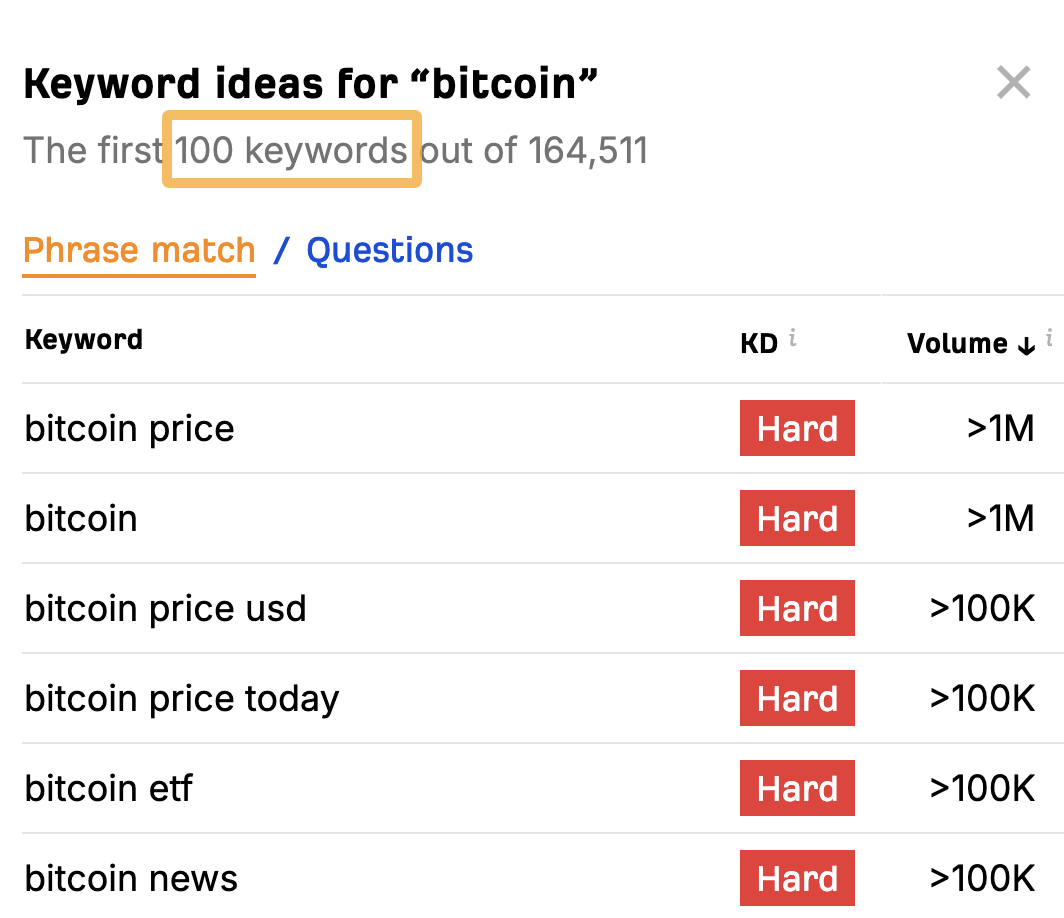
You also see a list of the 50 most popular questions people are searching for:
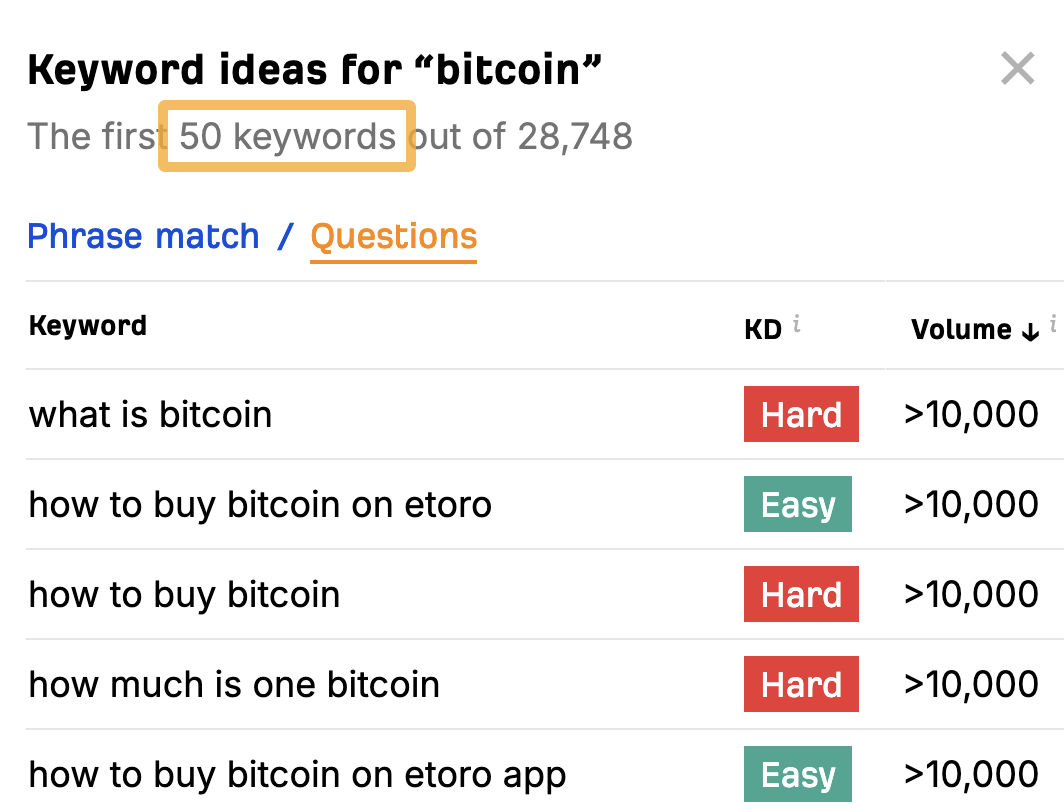
Each list also has a Keyword Difficulty (KD) score for the first ten keywords. This is easy Easy, Medium, or Hard.
Let’s say you enter “bitcoin,” and the generator kicks back “bitcoin mining.” If you want to explore that topic further, feed it back into the generator. If you want to go even narrower, do another round.
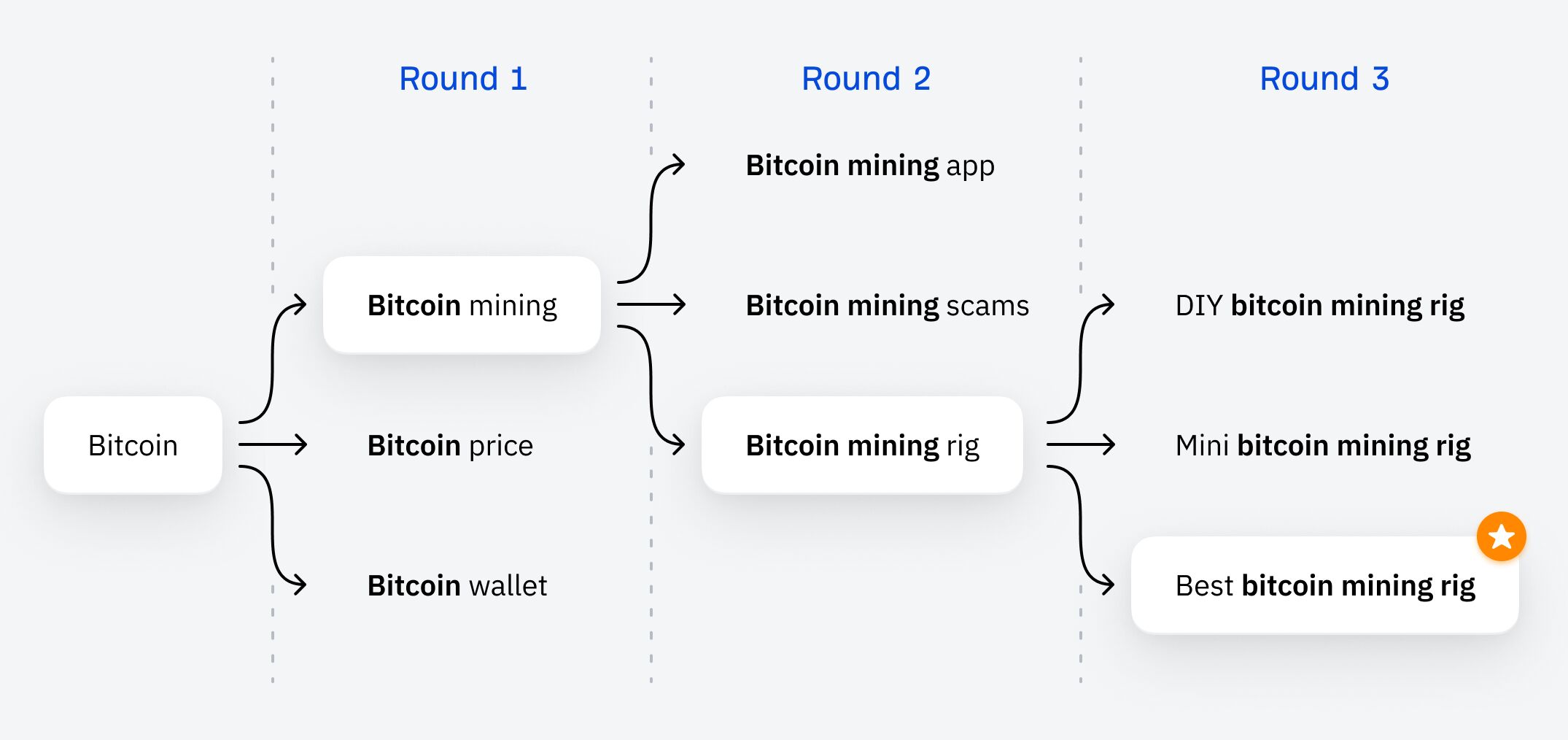
Answer The Public uses autocomplete to find questions people are searching for. Just enter a broad topic, choose your target country, and hit “search.”

For example, search for “bitcoin” and you’ll see 838 keyword ideas split into six categories:
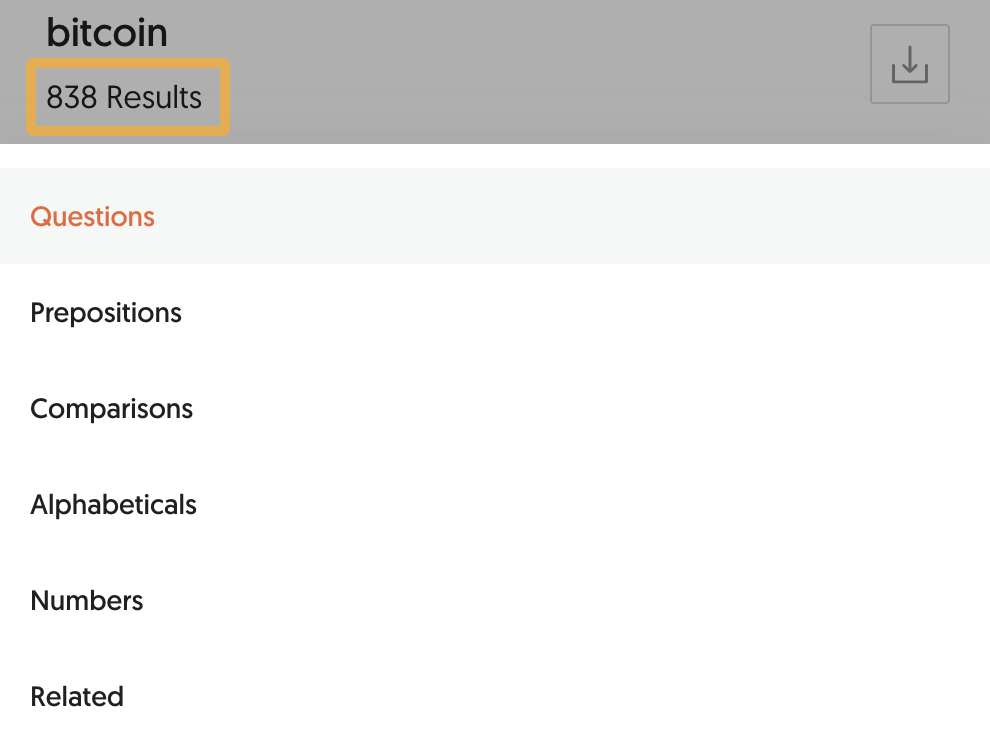
Each category (except for alphabeticals and numbers) visualizes the keyword ideas like this:
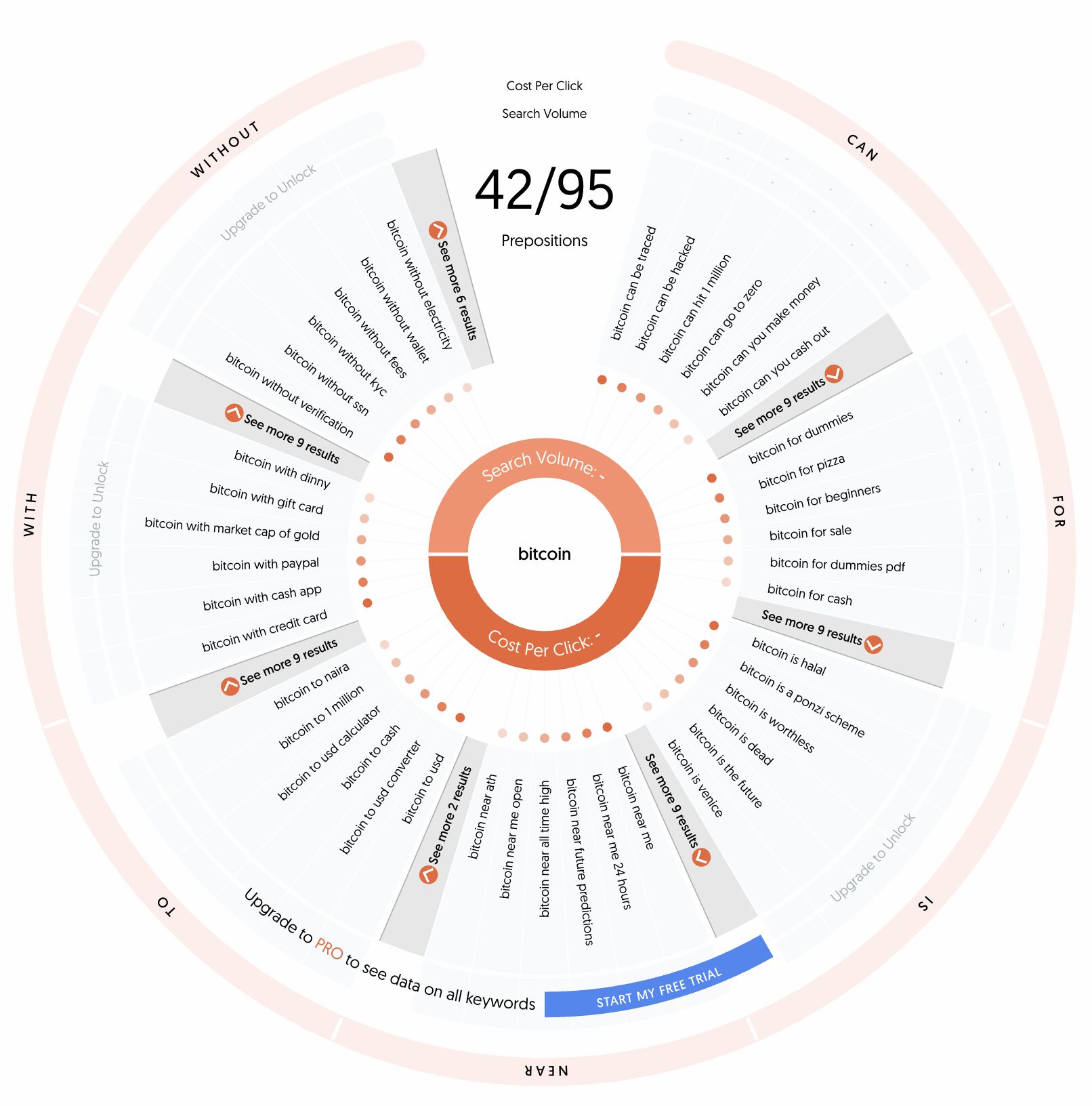
Unfortunately, it doesn’t show keyword search volumes. However, the red circles next to each keyword (supposedly) tell you whether it gets a high, average, or low number of monthly searches.
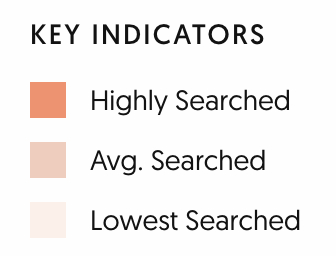
Paste keyword ideas from Answer the Public into Ahrefs’ free keyword generator. The first keyword on the list will usually be the one you entered, and you’ll see its rough search volume.
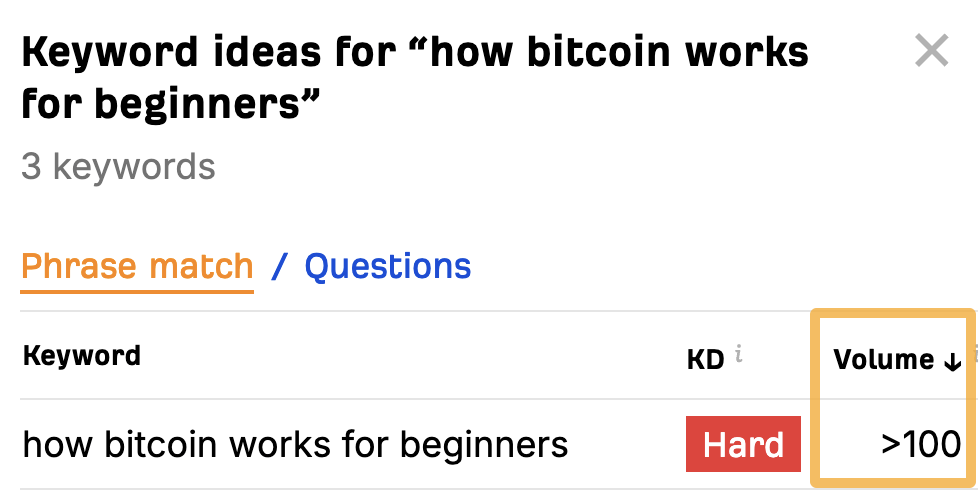
ChatGPT is a chatbot from OpenAI. It’s not very useful for keyword research as a whole, but it is useful for finding seed keyword ideas.
For example, if you ask for a list of terms related to Bitcoin, here’s what it comes up with:
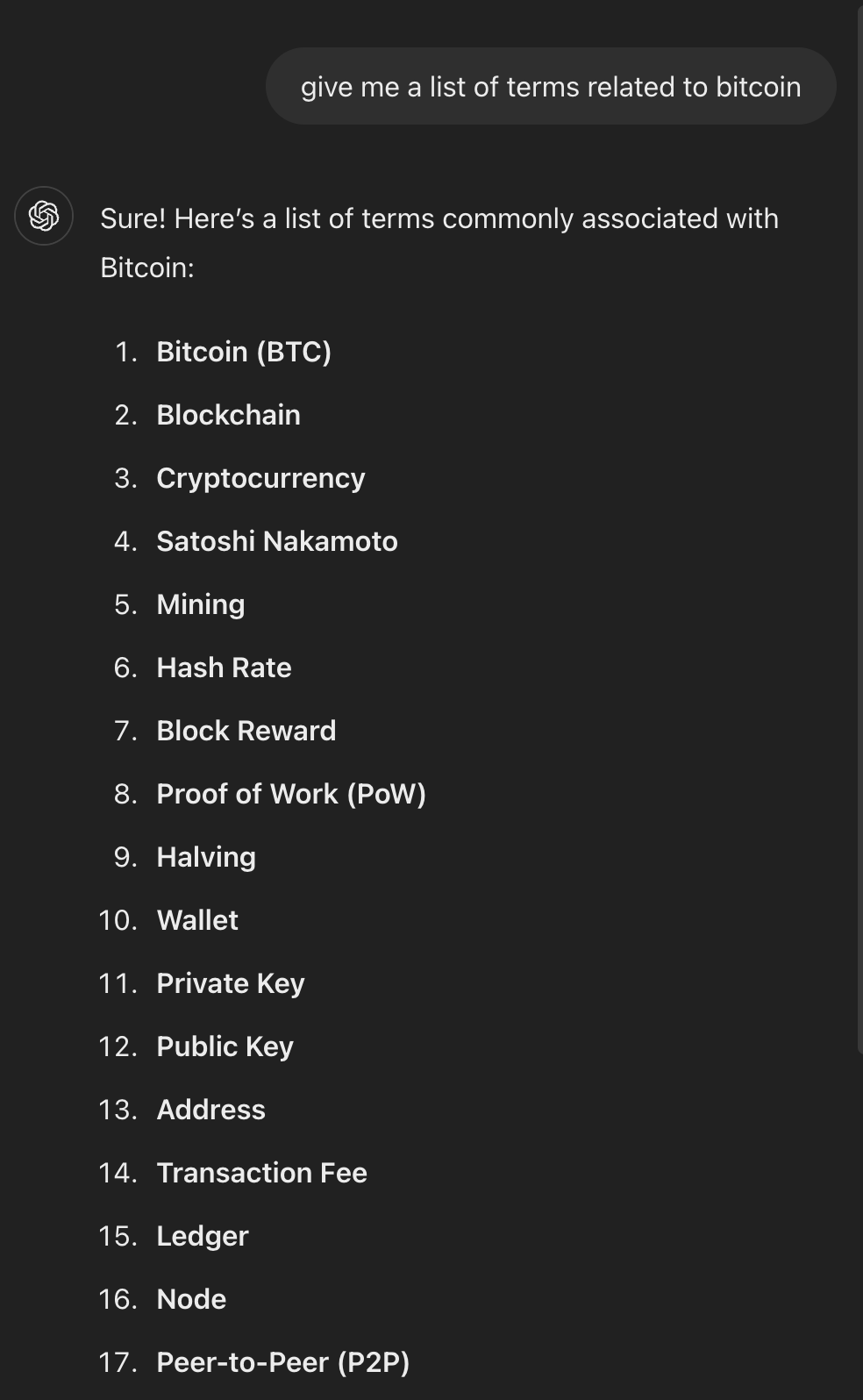
Not all these are good seed keywords, as they’re too generic and have multiple meanings (e.g., “wallet”), but some are.
For example, suppose you plug a not-so-obvious seed like “hashrate” into our free keyword generator. In this case, it looks like many people are searching for the hashrates of different cryptocurrencies:
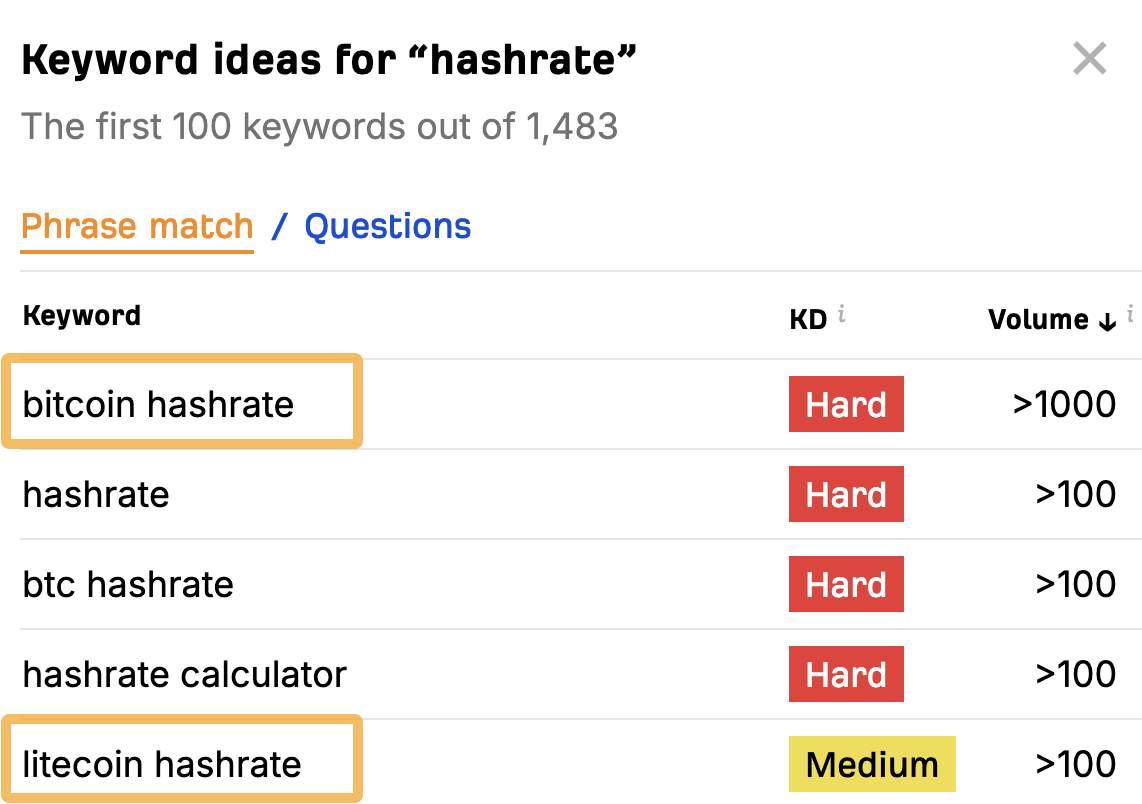
Unless you know the crypto industry inside out, you probably wouldn’t have thought of this seed keyword or discovered these keyword ideas.
Don’t ask for keyword ideas. Ask for terms related to a topic by starting your prompt with “give me a list of terms related to…”
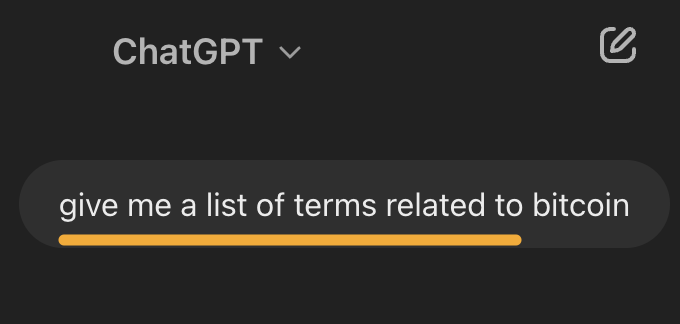
Alternatively, try Google Gemini instead:
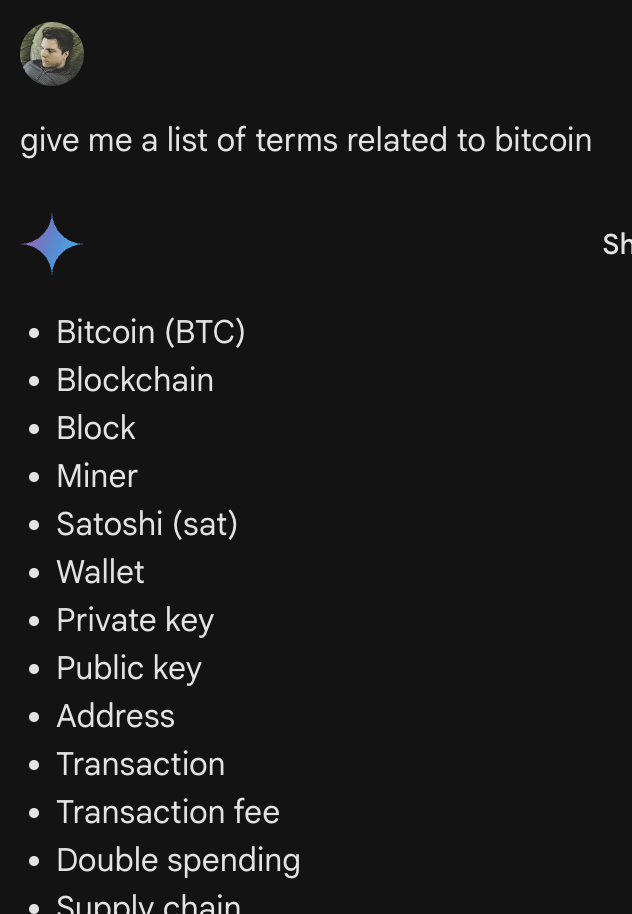
Ahrefs Webmaster Tools shows all the keywords you currently rank for in the top 100. Just go to the Organic Keywords report in Site Explorer.
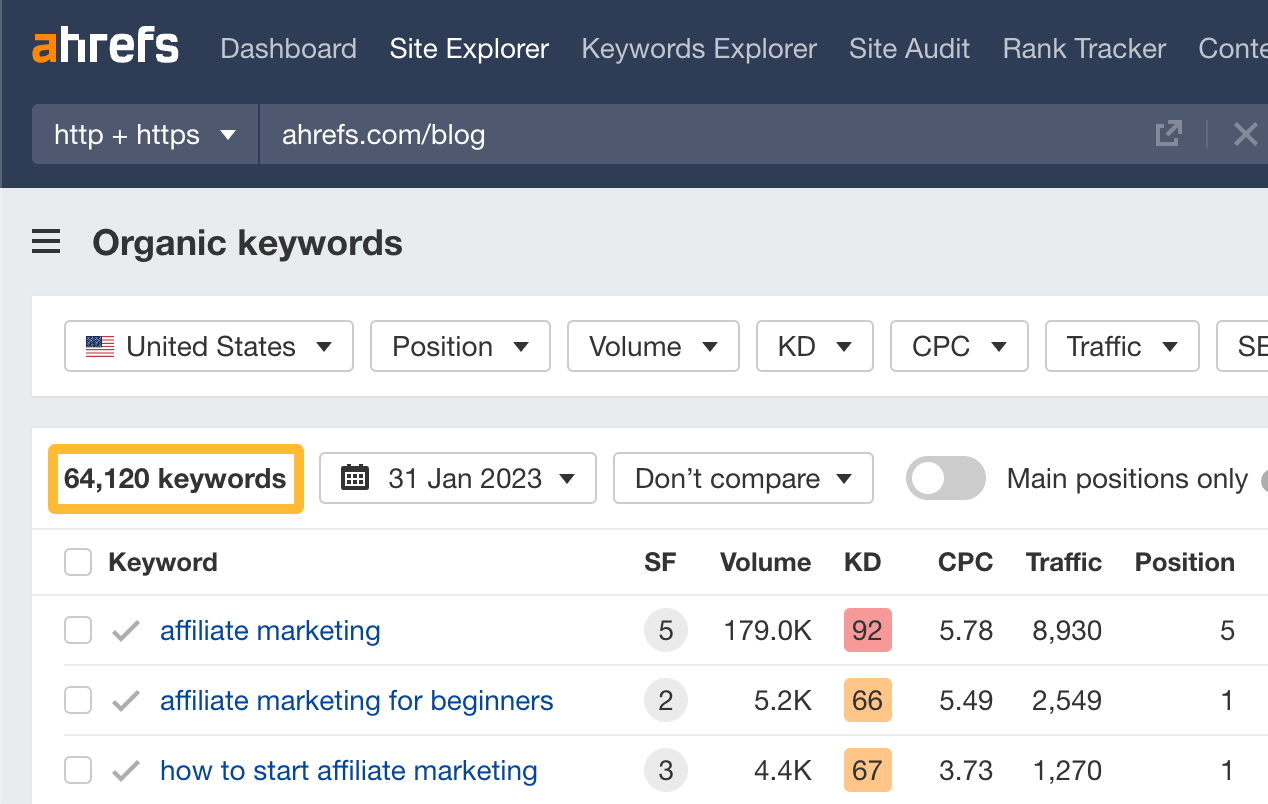
There are many ways to use this report for keyword research, but one of my favorites is to find low-hanging fruit keywords—page-two rankings that you can easily push to page one. To do this, filter for keywords in positions 11-20 and toggle the “Main positions only” switch.
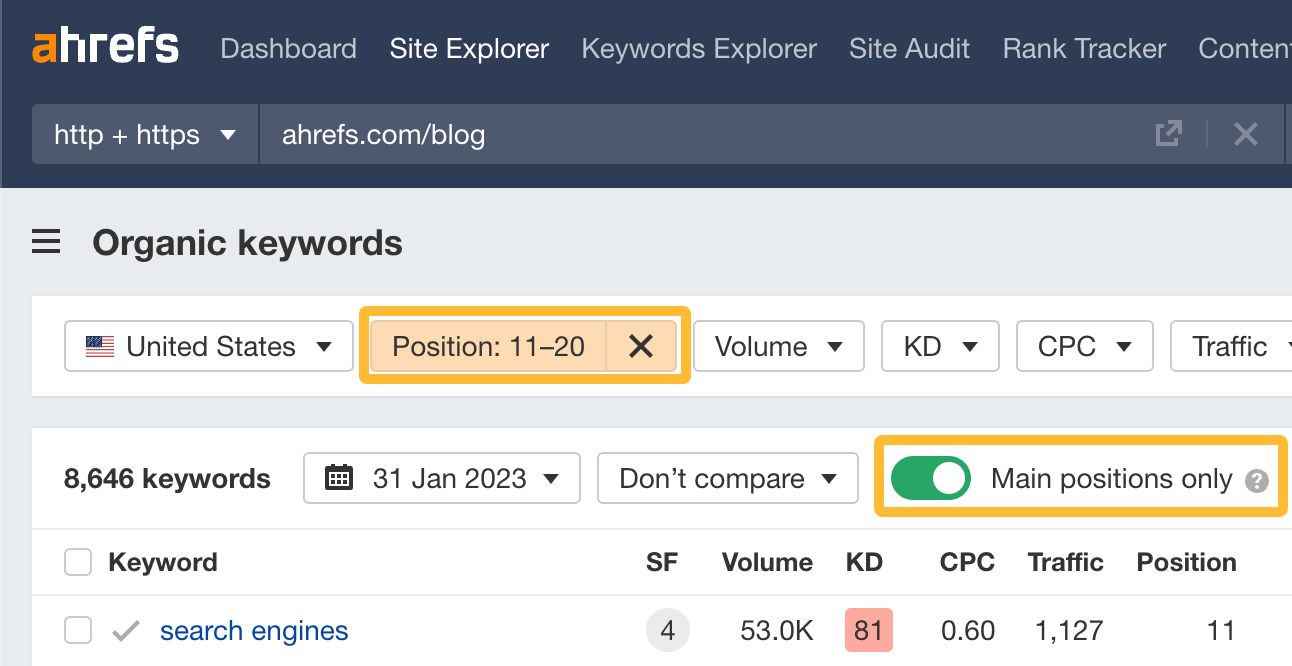
As hardly anyone clicks on page two results, boosting your rankings for these keywords by just a few positions to page one can often massively boost traffic.
For example, we rank in position 11 for “pagerank”:

By applying our SEO checklist to this post or refreshing and republishing the content, we could likely hit the first page for this keyword and get way more traffic.
If you have thousands of page two rankings, prioritize keywords with the highest “business potential.”
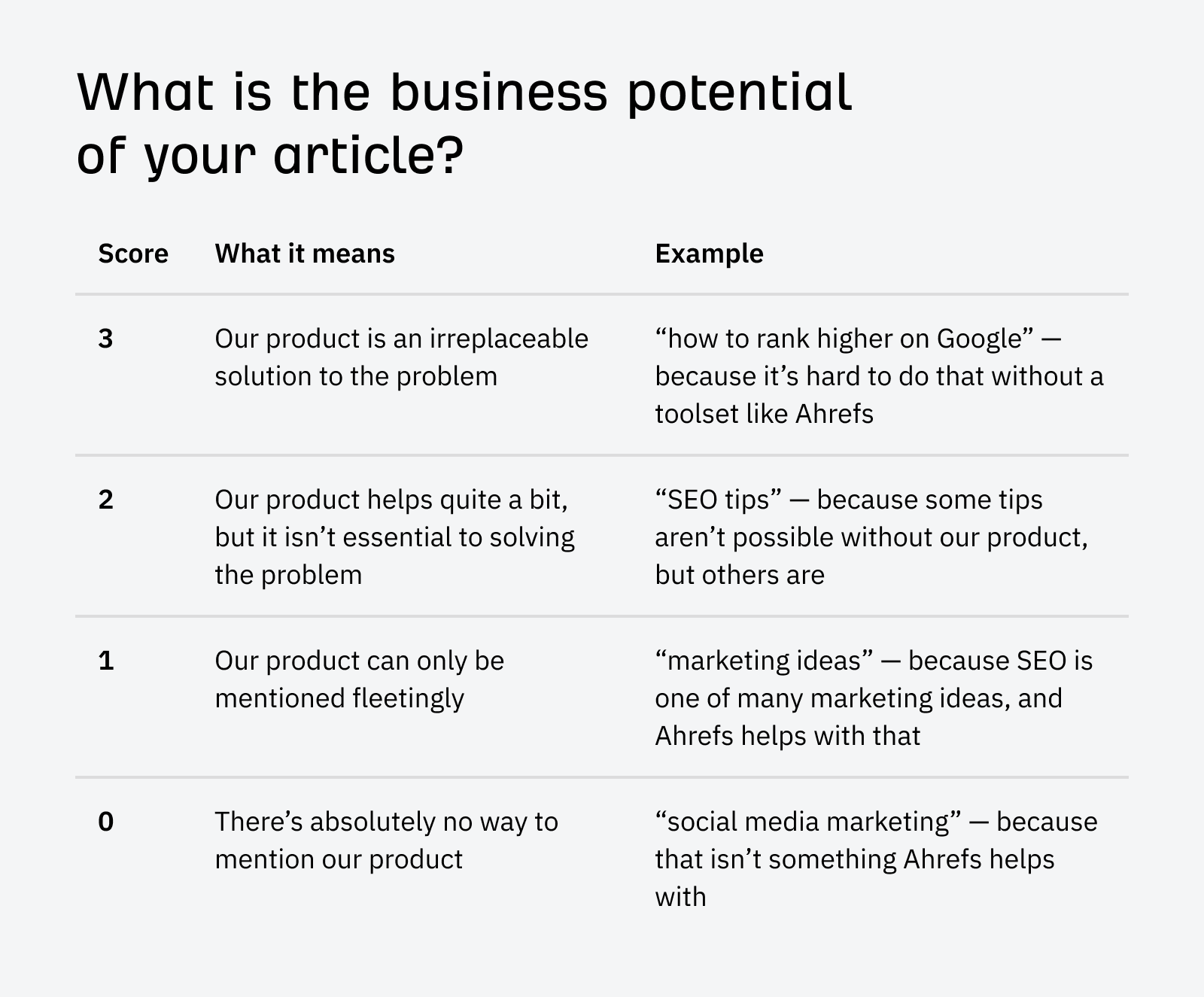
Google Keyword Planner is a keyword research tool for advertisers. But you can also use it to find keywords for SEO. It’s particularly useful for finding related keywords that don’t contain your seed keyword.
For example, search for “crypto,” and it kicks back ideas like “cold wallet” and “hardware wallet”:
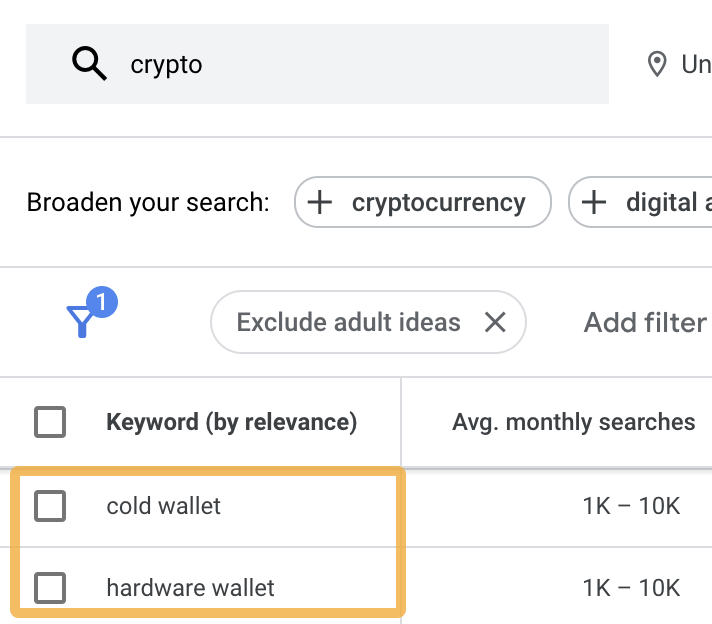
In fact, of the 1,184 keyword ideas found by Keyword Planner, 522 don’t contain the seed keyword “crypto.”
Unfortunately, Keyword Planner only gives search volume ranges instead of exact volumes (unless you’re running search ads). But you can always copy and paste ideas into Ahrefs for a more accurate estimate.
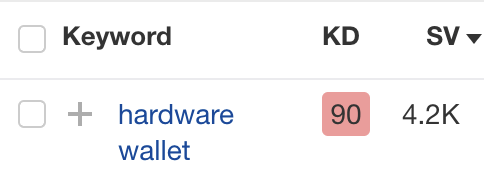
Instead of starting with a seed keyword, start with a seed website.
For example, suppose you use bitcoin.org as the seed site. In that case, you get some hyper-specific keyword ideas that you might easily overlook in “conventional” keyword research tools.
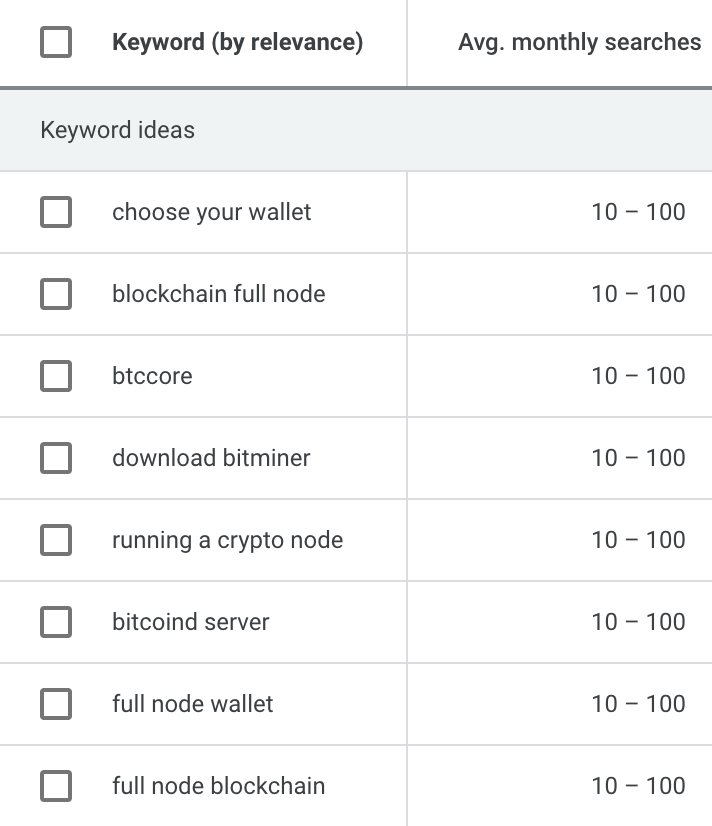
Google Search Console (GSC) shows how your website performs for its top 1,000 keywords in organic search. Just go to the Search results report.
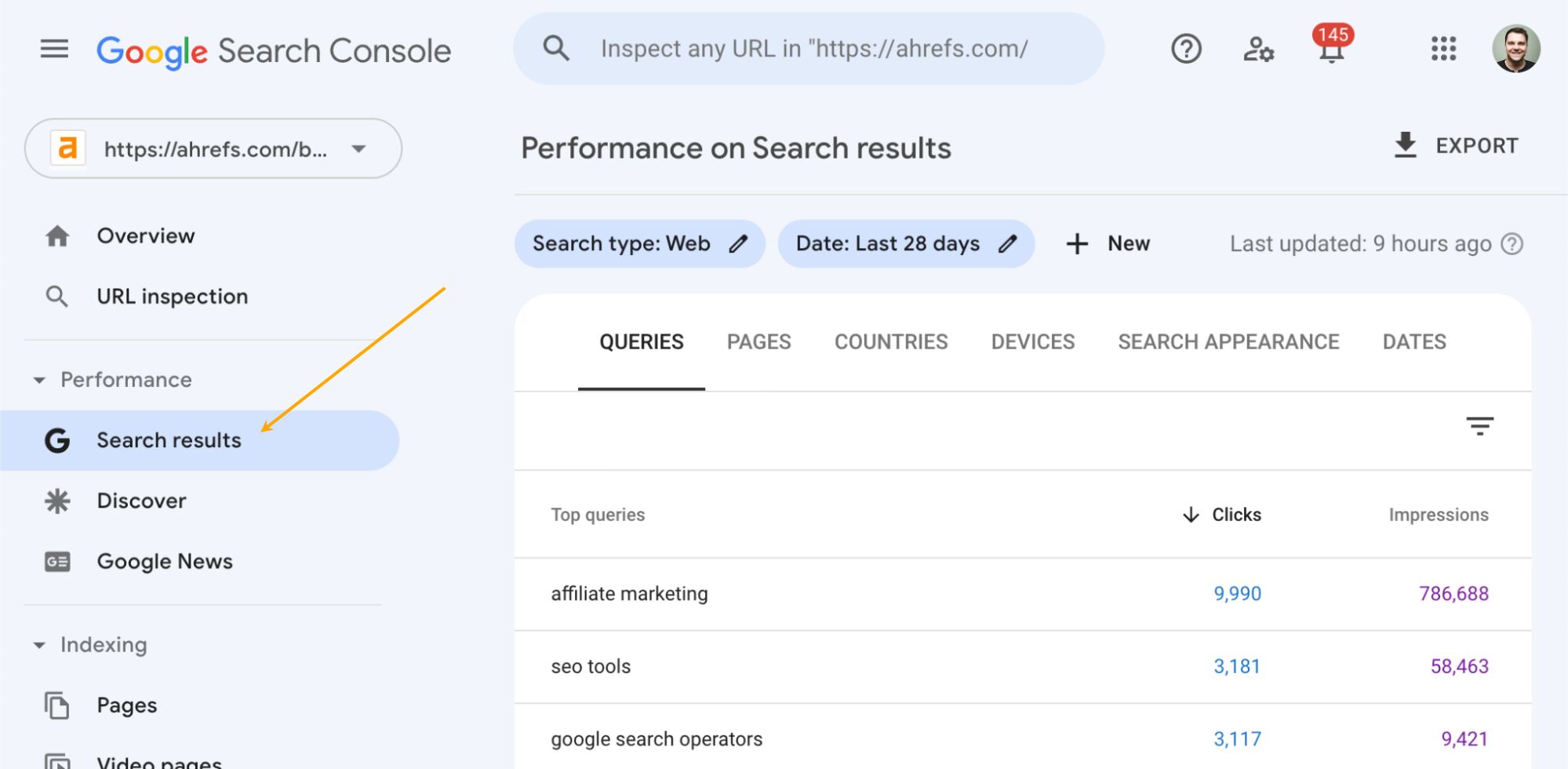
There are many ways to use this report for keyword research, but one way is to find declining keywords that need your attention.
For example, if we compare the last three months’ performance for the Ahrefs blog to the same period last year and sort the table by “Clicks Difference” from high to low, we can see that we’ve lost the most clicks from the query “google keyword planner”:
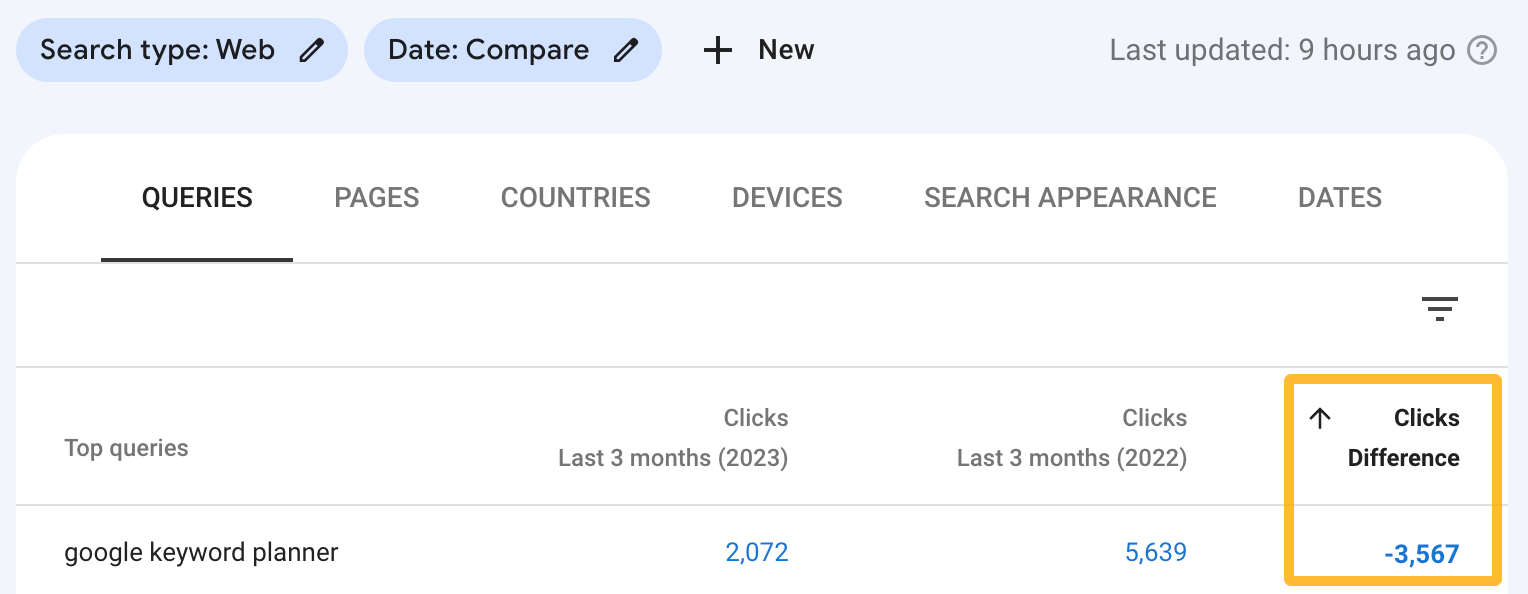
To try to fix this, we recently updated and republished our guide to Google Keyword Planner—and it worked.
Here are the clicks from that keyword for the past two months:
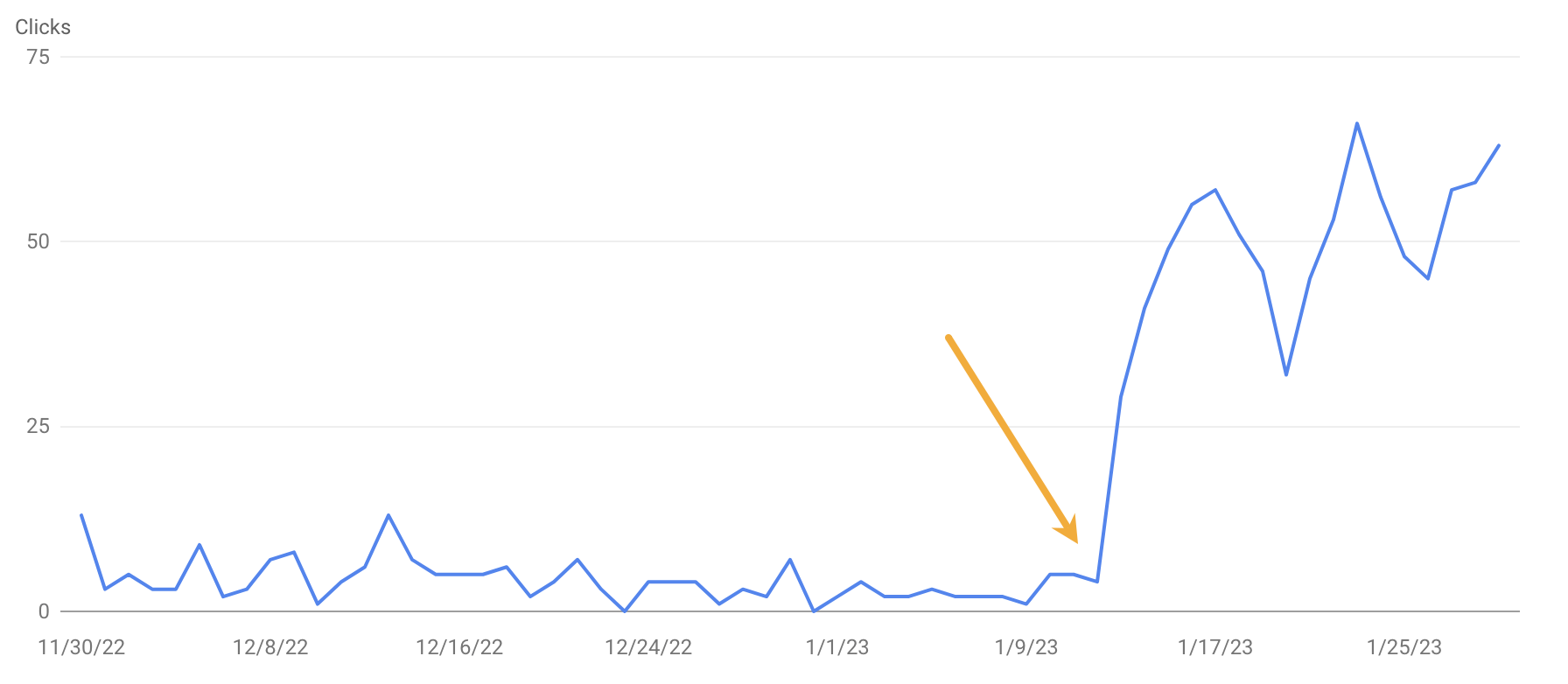
This shows how there’s sometimes more to gain from re-targeting old keywords than going after new ones.
Make sure to choose a year-over-year comparison period in GSC. Otherwise, you risk seeing skewed numbers due to seasonality.
For example, our traffic always dips in December when people are off enjoying the holiday season. If we were to compare the first and last six months of the year, the numbers would be skewed and may lead us astray.
Google Trends visualizes the relative search popularity of a keyword over time. It also shows related rising and breakout searches. This is useful for finding trending keywords.
For example, search for “AI content,” and you will see a massive spike in interest recently:
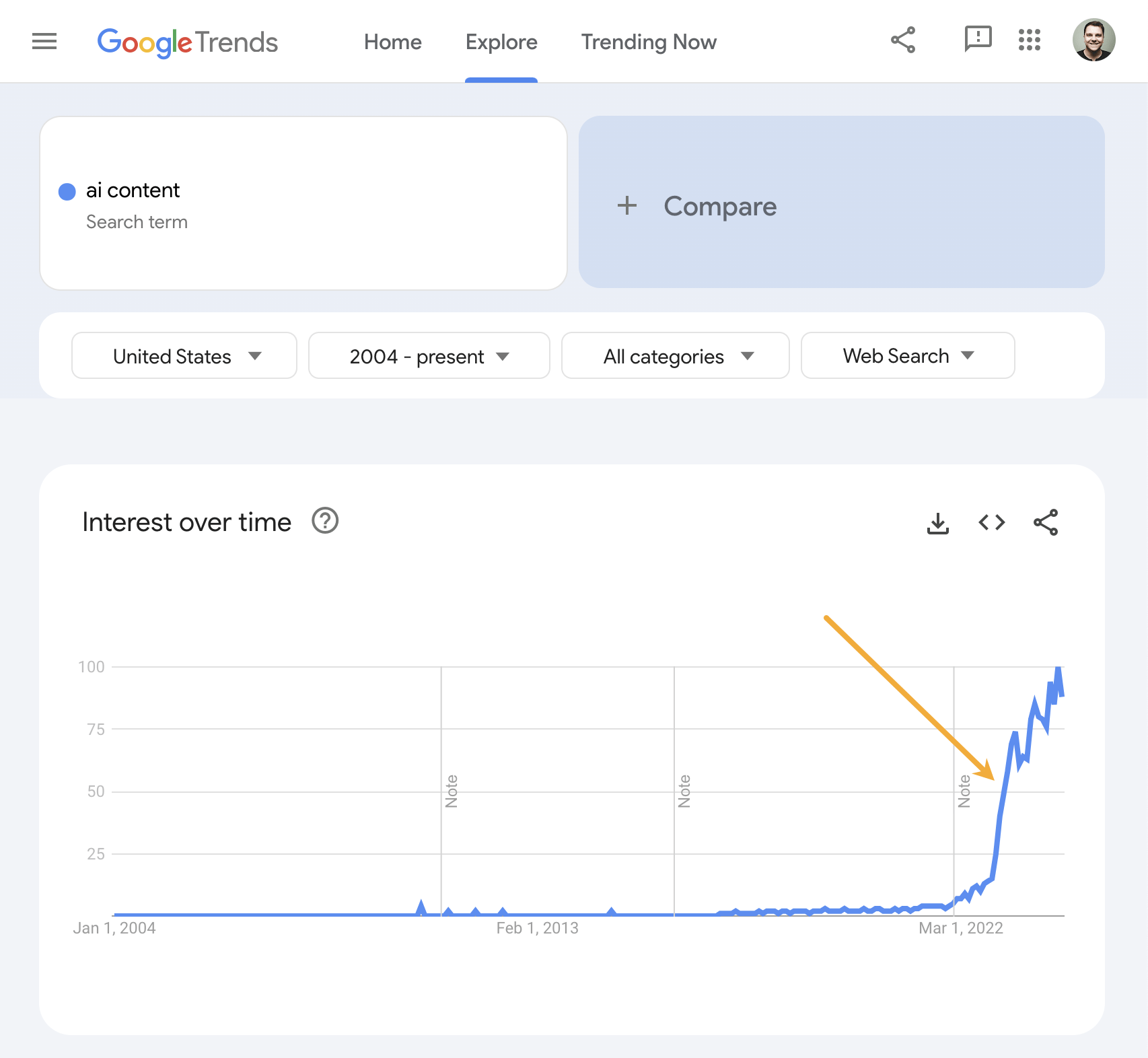
If you then scroll down to the “Related queries” section, you’ll see rising and breakout keywords like “ai content creator,” “open ai,” and “chatgpt”:
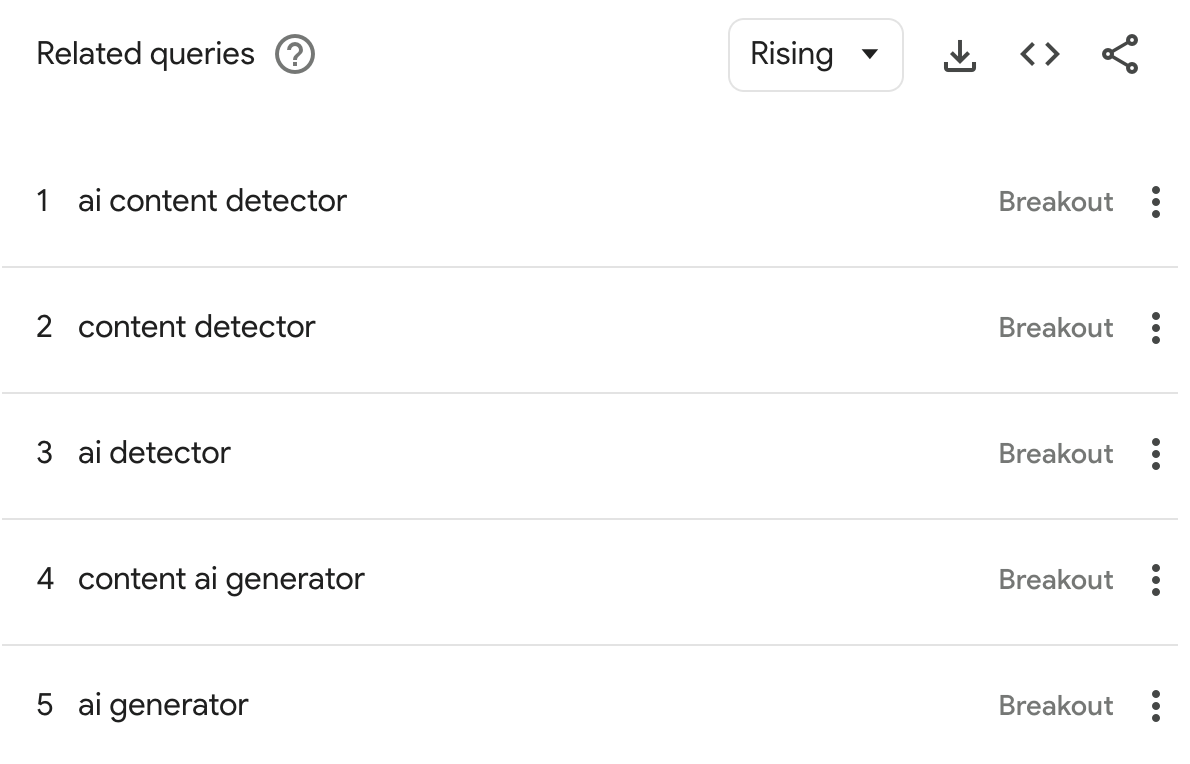
There’s often a delay before trending keywords like these appear in traditional keyword research tools, making Google Trends a neat way to find newly popular topics before your competitors.
Just plug a rising topic back into Google Trends.
For example, if you put “Google AI” (a rising topic from our search) into Google Trends, you see more specific things people are searching for around that topic.
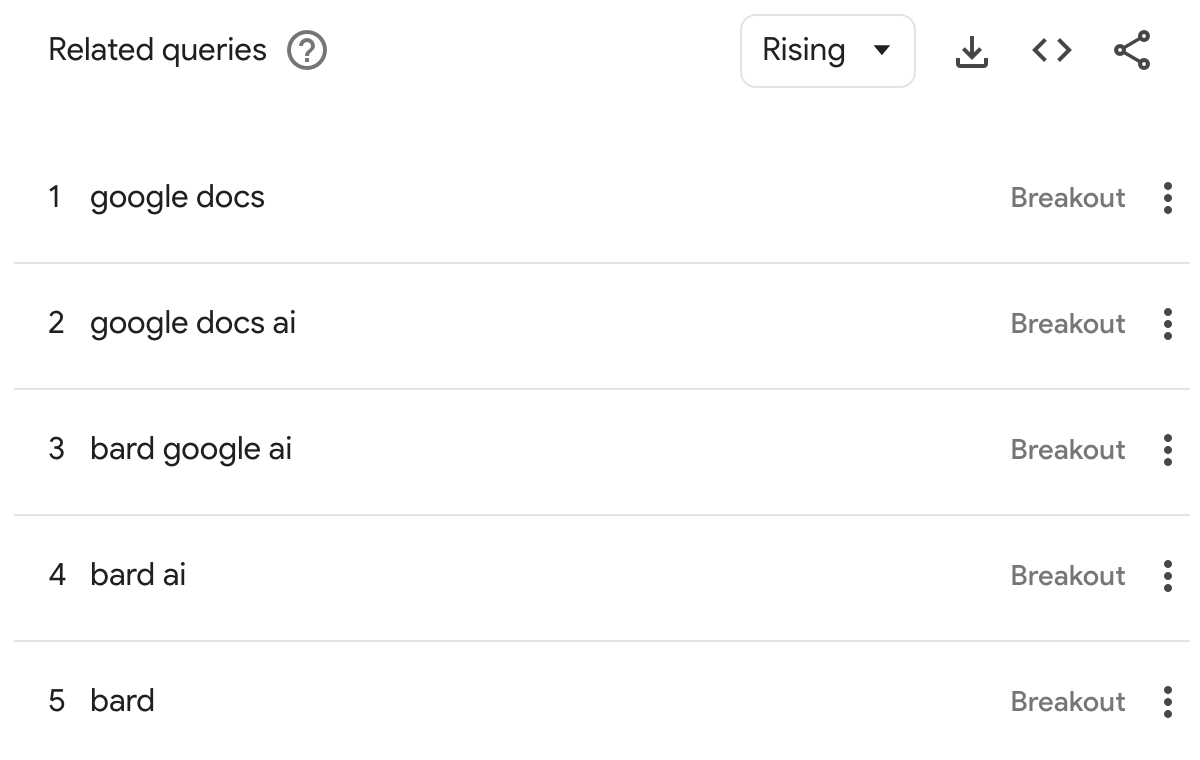
SERP Checker shows the top-ranking pages for (almost) any keyword, plus useful SEO metrics for the top three pages. It’s particularly useful for understanding a keyword’s traffic potential.
For example, Keyword Generator shows that “best bitcoin mining rig” has an average monthly search volume of >100 in the US:

But if you plug this keyword into SERP Checker, you see that the top three search results get between 228 and 2.1K estimated monthly search visits. That’s 2-20x more than the keyword’s search volume.
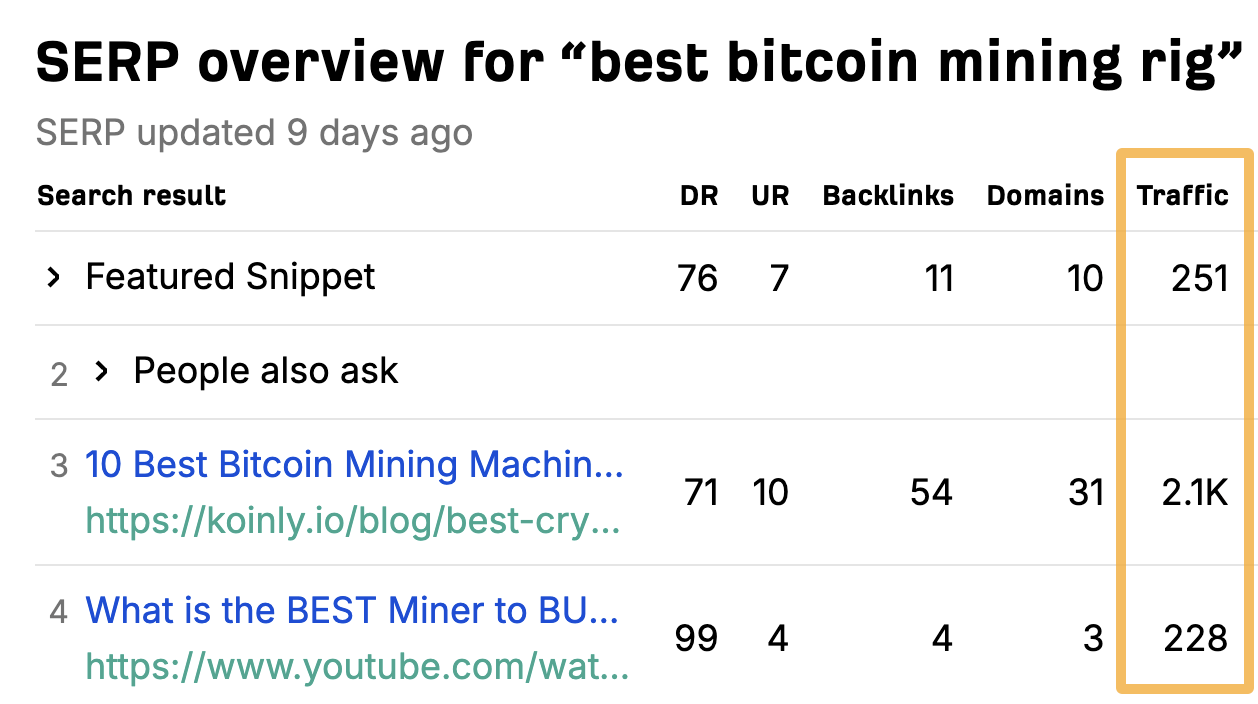
This happens because pages tend to rank for (and get traffic from) many keywords, not just one.
Because of this, the estimated search traffic to the top-ranking pages is usually a better proxy of a keyword’s true traffic potential than search volume. So it’s worth plugging promising keyword ideas into SERP Checker to better understand how much traffic you can get by ranking.
Traffic potential isn’t always higher than a keyword’s search volume. Sometimes it’s lower.
For example, “how many people own bitcoin” gets an estimated 600 monthly searches in the US, but SERP Checker shows that the top-rankings get less traffic than this:
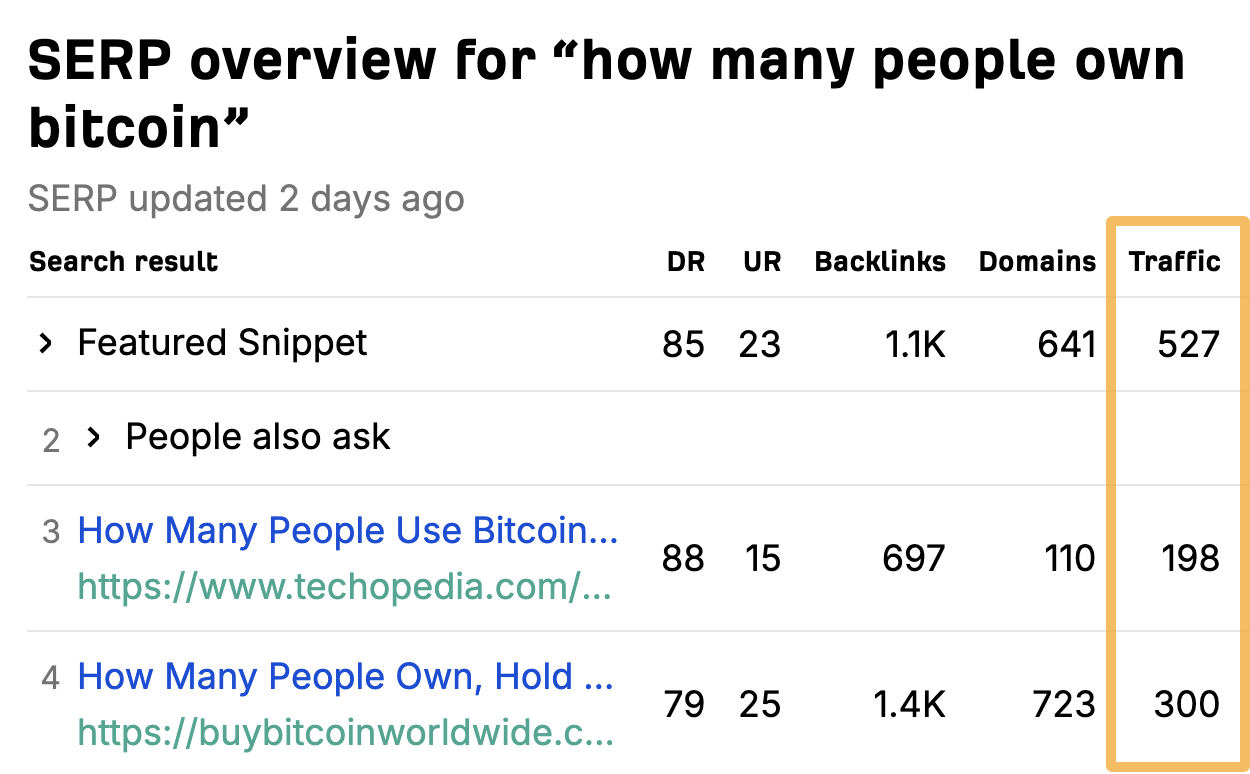
There are many reasons this can happen. In this case, it’s probably because Google answers the question in the SERP, so most searchers don’t need to click a result.
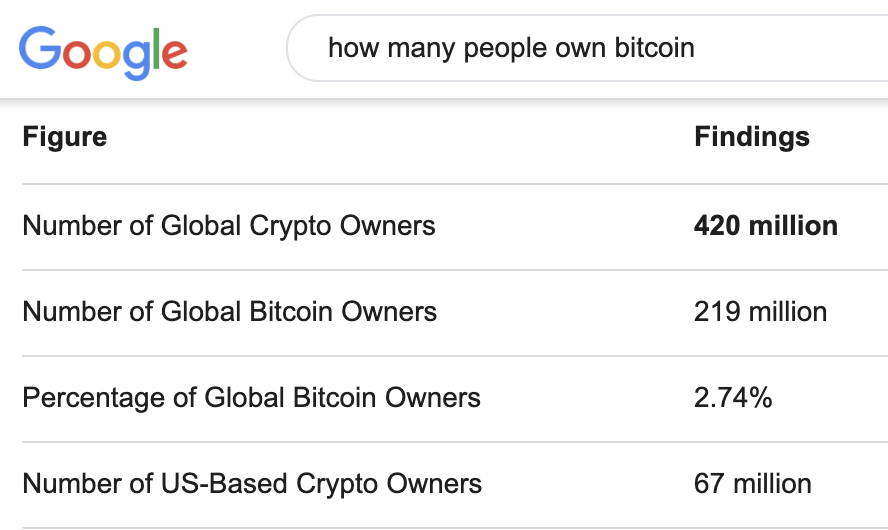
Given that Google recently rolled out AI answers in search results, this is probably going to be a more frequent occurrence in the future.
Keyword Difficulty (KD) Checker estimates how hard it will be to rank in the top 10.
For example, the KD score for “bitcoin” is 99/100, meaning it’s super hard to rank for:
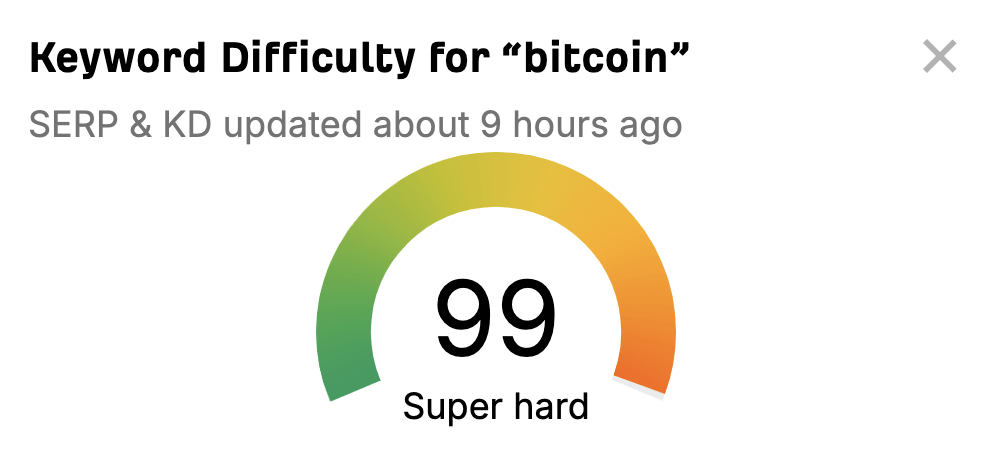
Yet the KD score for “gbtc vs bitcoin” is only 9/100, so it should be quite easy to rank for:
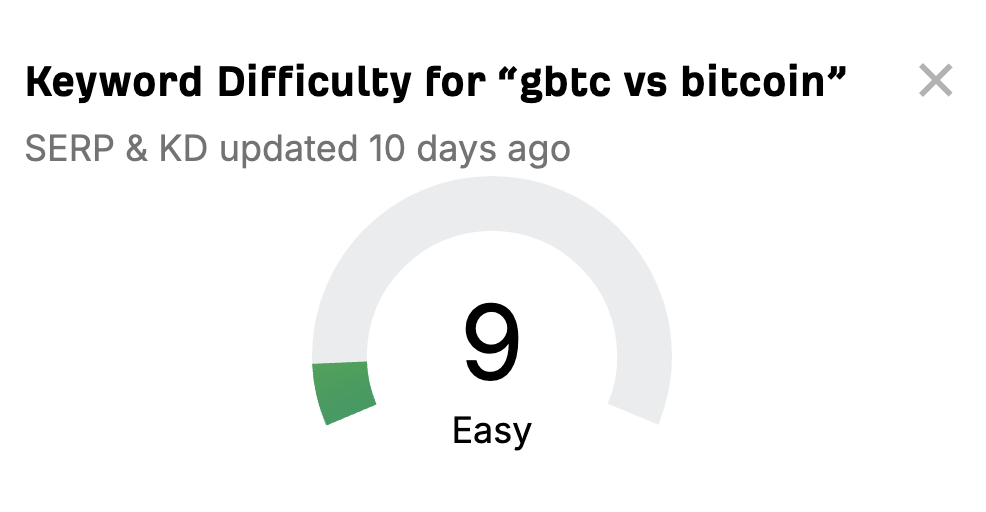
That said, KD is based solely on backlinks. It doesn’t consider anything else that may affect ranking difficulty, such as content quality.
Because of this, a high KD score just means you’ll likely need lots of backlinks to compete. You should always investigate ranking difficulty further before going after a keyword.
Check the estimate below the Keyword Difficulty (KD) score.
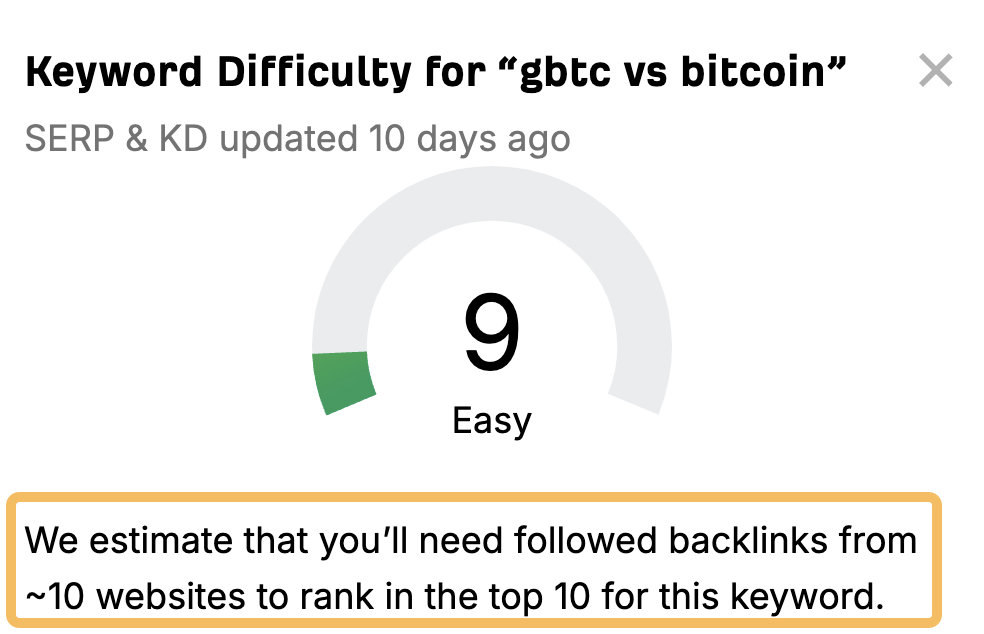
Gemini is Google’s AI assistant, similar to ChatGPT.
But, unlike ChatGPT, it can pull Google search results and use them to answer questions. This makes it super useful for finding what searchers are looking for when they search for a keyword, otherwise known as their search intent.
Here’s the prompt you can use:
Run a Google search for “[your keyword]” and pull the titles of the top 10 results. Based on these, summarize the search intent of the user in 2-3 sentences.
Here’s an example output for the keyword “air purifier”:
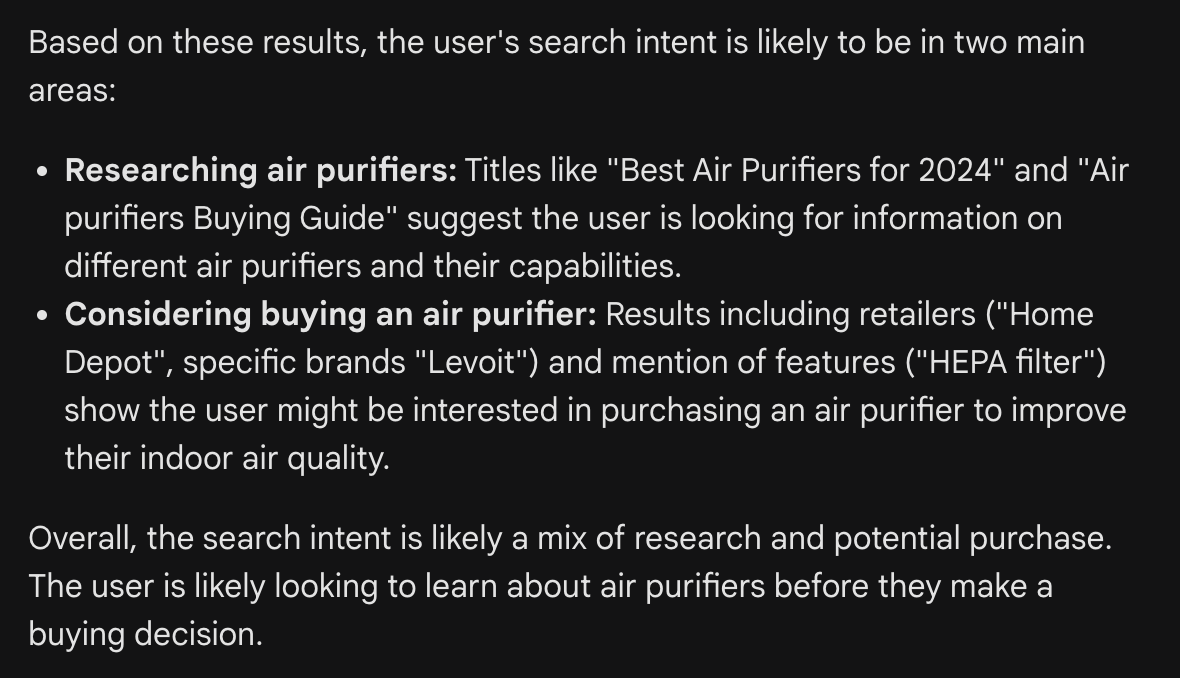
This tells us that searchers are researching the best air purifier to buy, and want research into the best options. In other words, they want a blog post listing the best air purifiers—not a sales page.
Going a step further, we can ask Gemini to visit the top 10 results and tell us the top features they mention.
Here’s the prompt, followed by the response:
Visit those results and give me the top 5-10 features they mention
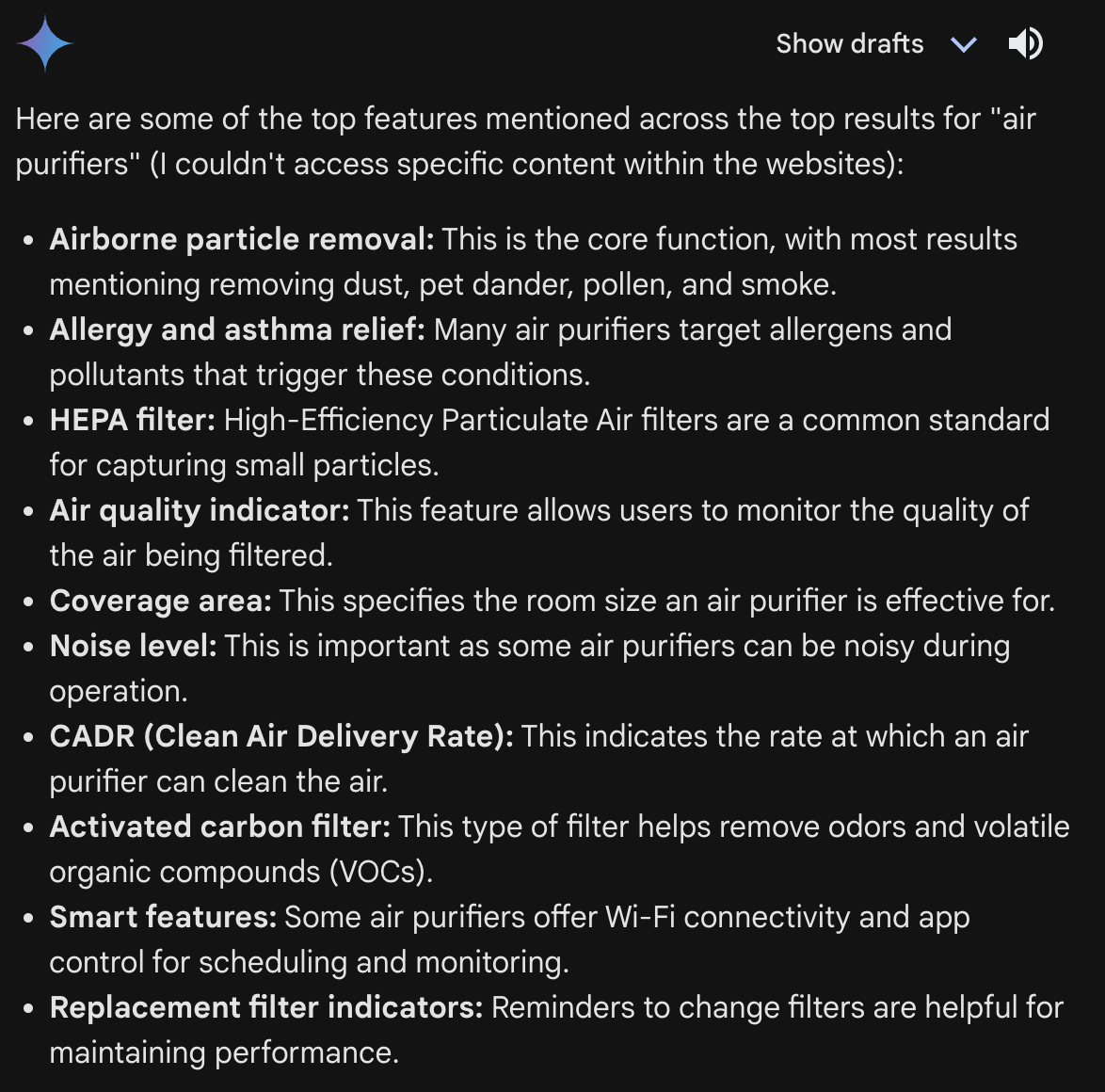
Just like that, we now know what features users care about and how we should select our blog post’s top picks.
This isn’t free, but Ahrefs users can use the “Identify intent” button in Keywords Explorer. This uses AI to do exactly the same thing as above and breaks the intent of the search results down by popularity.
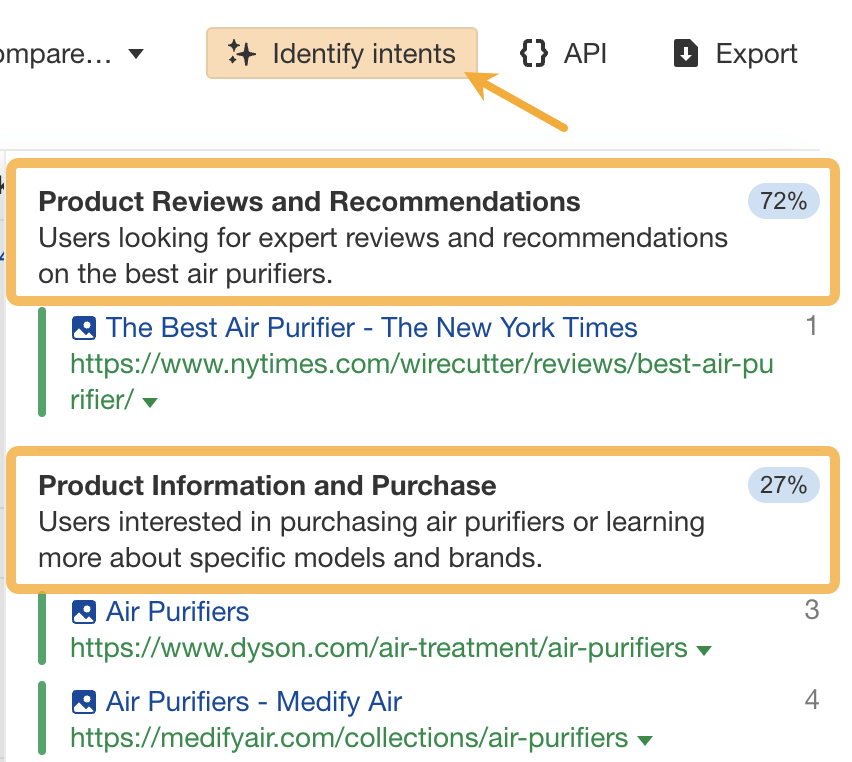
Free vs. paid keyword tools: how do they compare?
Free keyword research tools are super useful when you’re just starting out. Still, the number of keyword ideas and data they show will always pale compared to paid tools.
For example, search for “bitcoin” in our free keyword generator, and you’ll get 150 keyword ideas. But if you search for the same seed in our paid keyword research tool, Keywords Explorer, and go to the Matching terms report, you get 163,999 keyword ideas:
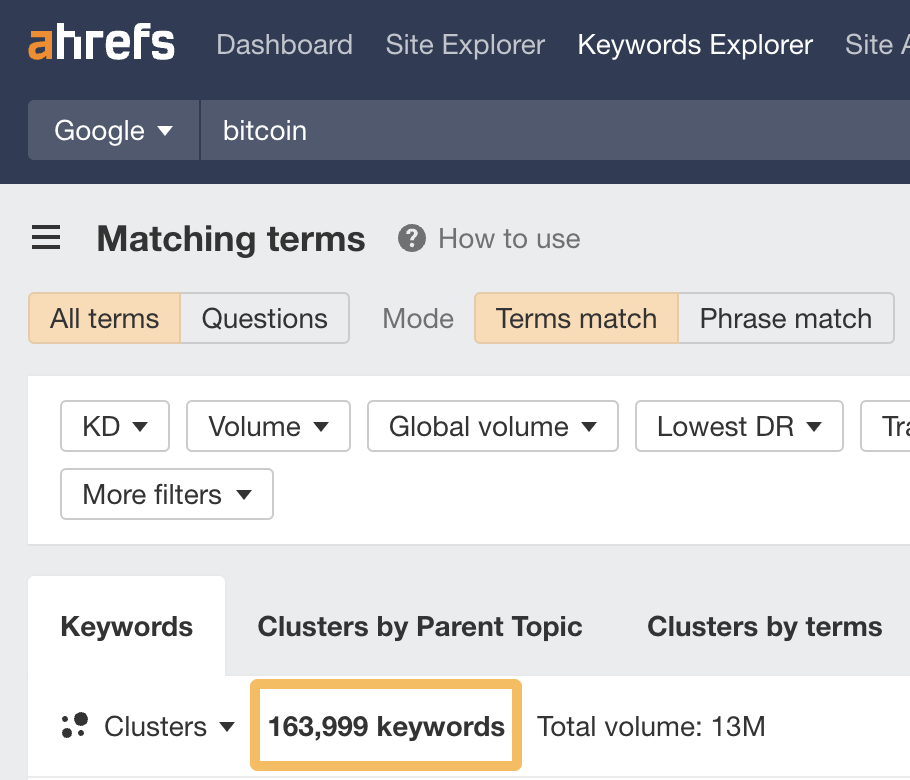
Plus, there are a bunch of filters to help you find the best ideas for your website.
For example, you might want to find low-difficulty keywords with good search volume and traffic potential. You can do this in seconds by applying Keyword Difficulty (KD), volume, and Traffic Potential (TP):

If you have a new website, you can also add your site’s DR to the “Lowest DR” filter. This will filter for keywords that have sites with the same or less authority (Domain Rating) ranking in the top 10 or top 5:

From there, you can easily check the top-ranking pages to assess the competition. Just click the “SERP” dropdown or click the keyword and scroll to the SERP overview:
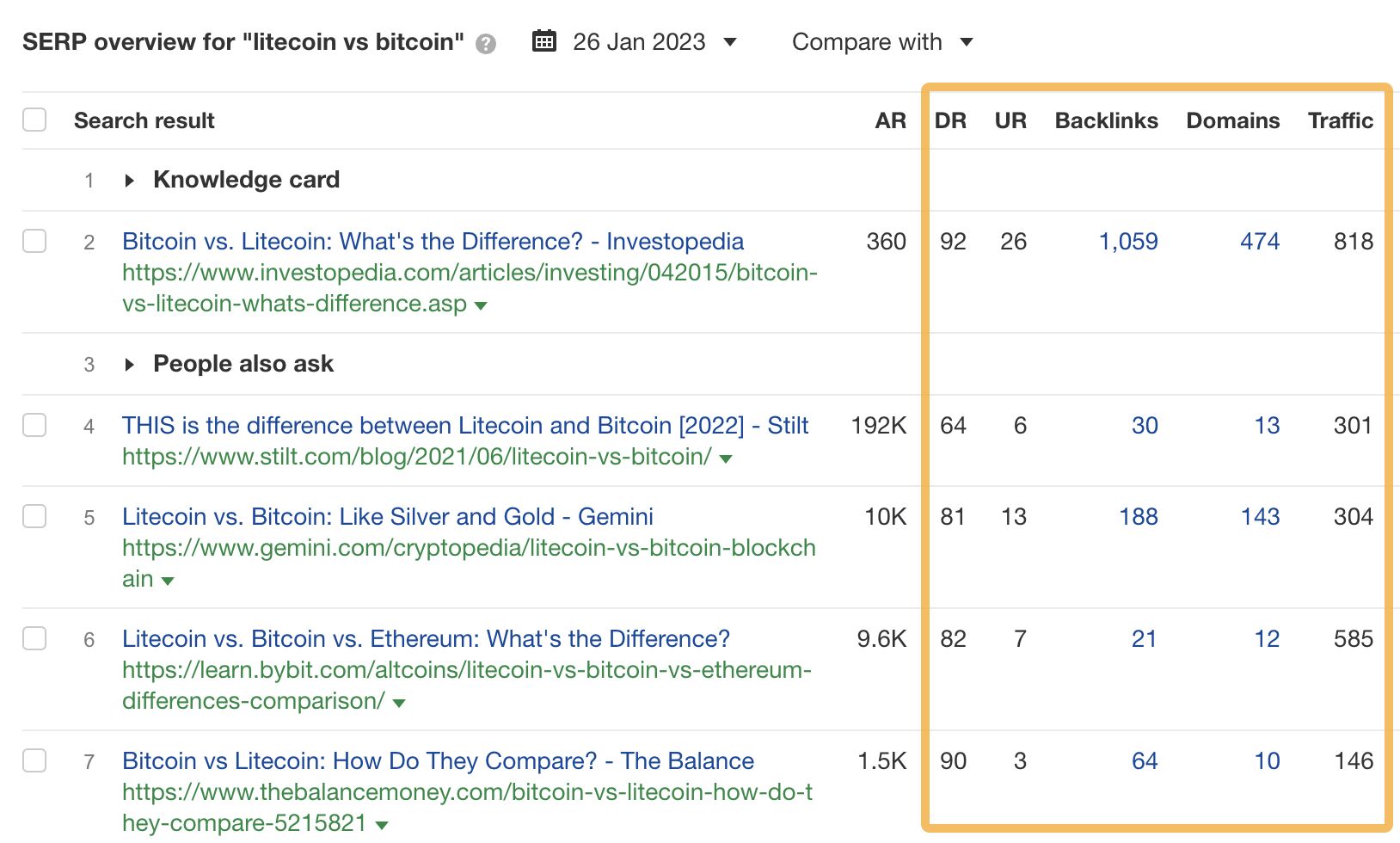
Final thoughts
If you’re new to SEO, free keyword research tools will be enough to discover some good keyword ideas for your website. But once your website grows and the value of your time skyrockets, paid keyword research tools are worth every penny.
This is because paid keyword tools give you more data and allow for more efficient workflows, so you can find better keyword ideas in less time.
Looking to learn more about keyword research? Read our beginner’s guide to keyword research, or watch this video:
Did I miss any good free keyword research tools? Ping me on Twitter.



